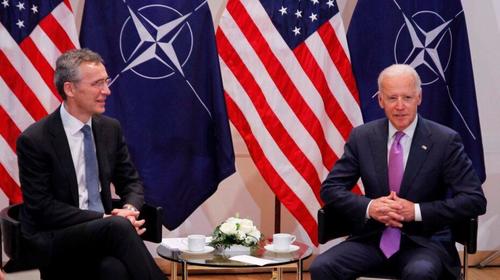
A month after his inauguration, President Joe Biden’s administration formally engaged on the international stage this week to set out key foreign policies.
His Secretary of Defense Lloyd Austin addressed a two-day NATO summit via video link in which he relayed the message from Biden that the US would re-engage with transatlantic European allies. Four years of Donald Trump’s abrasive America First policy was being jettisoned in place of a more smooth, consensual approach under Biden.
President Biden would himself address videoconferences of the Group of Seven nations held Friday, as well as the annual Munich Security Conference over the weekend. A major development is the Biden administration’s announcement that it is ready to rejoin the international nuclear accord with Iran, thereby repudiating Trump’s rejection of that deal. It remains to be seen, however, just what the Biden administration will want in exchange for honoring its signature to the treaty which was negotiated in 2015.
Other policy reversals include US troops remaining in Germany in contrast to Trump’s plan to draw down numbers. That sounds like another exercise in repairing relations with the Europeans.
Previously, Biden also announced he would negotiate with Russia on extending the New START treaty limiting nuclear weapons. The latter move is cautiously welcomed. But, again, it remains to be seen.
There’s no doubt about the change in style. The Biden administration is promising to be collegiate about strategic decision-making with European allies. The bullying rhetoric used by Trump for hectoring European members to spend more on NATO military commitments has been ditched by Biden. The Washington establishment was acutely concerned that Trump’s transactional tirades were alienating European allies and undermining the 30-nation NATO alliance, which in turn was diminishing America’s authority and frustrating its interests.
Historically, the United States relies on NATO as a conduit to project its power and influence over Europe. This was its fundamental objective when NATO was first set up in 1949 at the start of the Cold War against the Soviet Union. In recent decades, NATO has assumed an ever-expanding purpose for American imperial power projection, encompassing not just Western Europe but all of Europe right up to Russia’s borders. NATO has become a vehicle for American hegemonic ambitions holding sway over the Balkans, Caucasia, North Africa and the Middle East, Africa and Asia-Pacific.
For an organization that nominally originated for maintaining security in the North Atlantic, it sounds rather odd indeed to hear its spokesmen talk now about the need for NATO to confront China. That oddly expanded global mission reflects the real but unspoken fact that NATO is all about serving American global ambitions.
Former President Trump was too ignorant or obsessed with money-grubbing financial costs – “we’re being ripped off” he would repeatedly complain with regard to NATO – to realize the strategic bigger picture of what the alliance is really purposed to serve.
Under a new man in the White House – an old-time establishment operative – there is seemingly a more consensual approach with allies. Nevertheless, underlying the liberal lexicon there is the same old mantra of hostility towards Russia and China.
Lloyd Austin, the Pentagon chief, told European allies this week that there would have to be “more burden sharing” in order to confront the “threats” allegedly posed by Russia and China. Biden continued the same theme of confronting Russia and China during his G7 and Munich conferences over the weekend.
American hegemonic ambitions required to satisfy its corporate capitalism are dependent on a zero-sum geopolitics. The globe must divided into spheres of influence as in the earlier Cold War decades. There must be antagonism to thwart genuine cooperation which is anathema to American capitalism. Indeed, it can be said that the Cold War never actually ended when the Soviet Union dissolved more three decades ago. America’s imperialist ideology continued under new guises of “fighting terrorism”, “democracy promotion and nation building”, or more recently “great power competition” with Russia and China.
The bottom line is that NATO is more important than ever for enabling Washington’s global power ambitions given the demise of American capitalism and the rise of China and Eurasia.
NATO provides a crucial political cover for what would otherwise be seen as naked American imperialism.
The contradiction, however, is that the world is increasingly moving towards a multipolar realm where nations are more interdependent and integrated in economic relations. Russia and China are major trading and investment partners with Europe, not adversaries, and even less so enemies. The latter depiction is absurd.
The only people claiming that Russia and China are a “threat” are the Americans, regardless of who is sitting in the White House, whether Republican or Democrat. (Well, not the only people. There are minor figures in Europe, such as the reactionary, rightwing Baltic politicians, who also spout Russophobia and Sinophobia in dutiful deference to their American mentors.)
Thus it can be adjudged that there will be no fundamental post-Trump reset of NATO under Biden. The organization remains what it has always been, a war machine to advance American imperialist objectives of hegemony. The only difference is the Biden administration is more savvy about projecting a more palatable image and rhetoric about “consensus”, “diversity” and “burden sharing”.
This revamped, yet in essence ideologically rigid, NATO suffers serious dissonance in practical relations with the real world of multipolar evolution. Biden will try to cohere NATO members to America’s global ambitions but those same members are inevitably aligning with the rest of the world out of their own political and economic self-interest. The more militaristic NATO tries to become at the goading of the Americans and their European flunkies like Secretary General Jens Stoltenberg, the more the alliance is likely to unravel. Its imperialist function is no longer fit for purpose nor viable in today’s world.
The more the US pushes NATO as its vehicle, the more it is apparent that the battery of American power is running flat.
